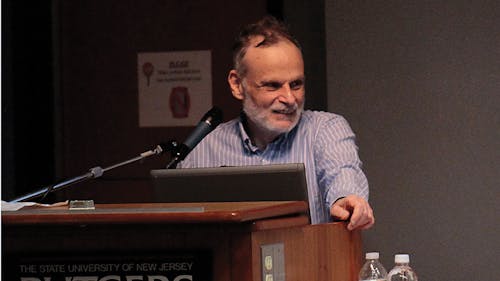Panel considers Wikipedia’s validity

With more than three million articles and counting, Wikipedia administrator David Goodman and contributor Ann Matsuuchi spoke to University librarians and professors yesterday about the growing world of Wikipedia and the importance of open access websites.
“The distinctive feature of being extremely large is the reason that it works,” Goodman said. “Anybody can collect information and start an encyclopedia and let it grow on with how many people get involved with it.”
This program, hosted in the fourth floor lecture hall in Alexander Library, is one of three events celebrating Open Access Week, encouraging technologies without borders, said Laura Mullen, librarian at the Library of Science and Medicine on Busch campus.
“When you imagine who is behind Wikipedia, you don’t imagine librarians,” said Matsuuchi, an instructional technology/systems librarian at LaGuardia Community College/CUNY. “Wikipedia was intended to be an adult encyclopedia for anyone from the high school level and up. It was not aimed at a subject field.”
The academic topics only contribute to a small part of the three million articles on the English Wikipedia, Goodman said.
“On Wikipedia, there is a immense number of things to do. I can pick what I want to work on,” he said. “It tends to be a little bit addictive, that is why there is a relatively small number of contributors.”
There are about 20,000 active volunteers contributing approximately one to two hours a day with the mean age being college students, Goodman said.
Coverage of rock and railroad trains is superlative while detailed coverage of medieval history is sketchy because most people who contribute do it as a hobby, Goodman said.
“This is why the size matters,” he said. “There’s a very wide range of interests. Although medieval history may be the weakest topic, I know five to 10 people who specialize in it.”
Kevin Mulcahy, a librarian in Alexander Library, said he encouraged students to get away from the notion of not using Wikipedia as a scholarly source.
“During a seminar [that I ran] on training teacher assistants how to use the Internet in their courses, we demonstrated learning through collaborating information from Wikipedia and compared it to a regular website such as the depth of their abstract … and currency of the information,” Mulcahy said.
Goodman said the proper way for students to use Wikipedia is as a first resource like an encyclopedia.
“It’s not the only resort and students shouldn’t rely on it completely. One of the ways we provide for people … is its references,” he said. “Not everyone who edits is an expert. Why would anyone believe it all?”
When Wikipedia says anyone can edit, anyone can edit, Goodman said. People do not need to register in order to encourage attributers. But if a user wanted to create a page, then they need to register.
“People working on controversial sexual content, don’t wish to use their name,” he said. “The topic of pornography apparently has a strong page, but then again some don’t attribute themselves for good reason. The authority is based on the number of contributors.”
Goodman said no one thought the idea that unattributed edits and would work on a large scale, but to their surprise the quality has gone up substantially.
“Some of the articles are so good that people are using them for newspaper material and doing stories off of them,” he said. “If it were really reliable source then [it could be understandable]. The other areas [excluding medicine] in general are not.”
Goodman said students should be cautious when citing the site as a scholarly source.
“The article is going to change. It may change 100 times a day,” he said. “The best way to cite the article is being citing the article with a specific time.”
One audience member pointed out the gender inequality of contributors on Wikipedia and asked what could be done to improve the imbalance.
“Men tend to be nerds,” Goodman said. “I know women who are nerds too, but generally it’s relatively rough for women to contribute. It’s a perfectly textual endeavor [to get women involved].”
Goodman said women are not the only group underrepresented in terms of contribution. There has also been very little participation from American racial minorities on the English Wikipedia.
Women participation on Wikipedia four years ago was around 8 percent, he said. But today that percentage has doubled.
Goodman said they are trying to improve the statistic.
“Anyone can do anything they like,” he said. “It’s very hard to get rid of an established contributor. I think it’s something itself part of the general culture.”



